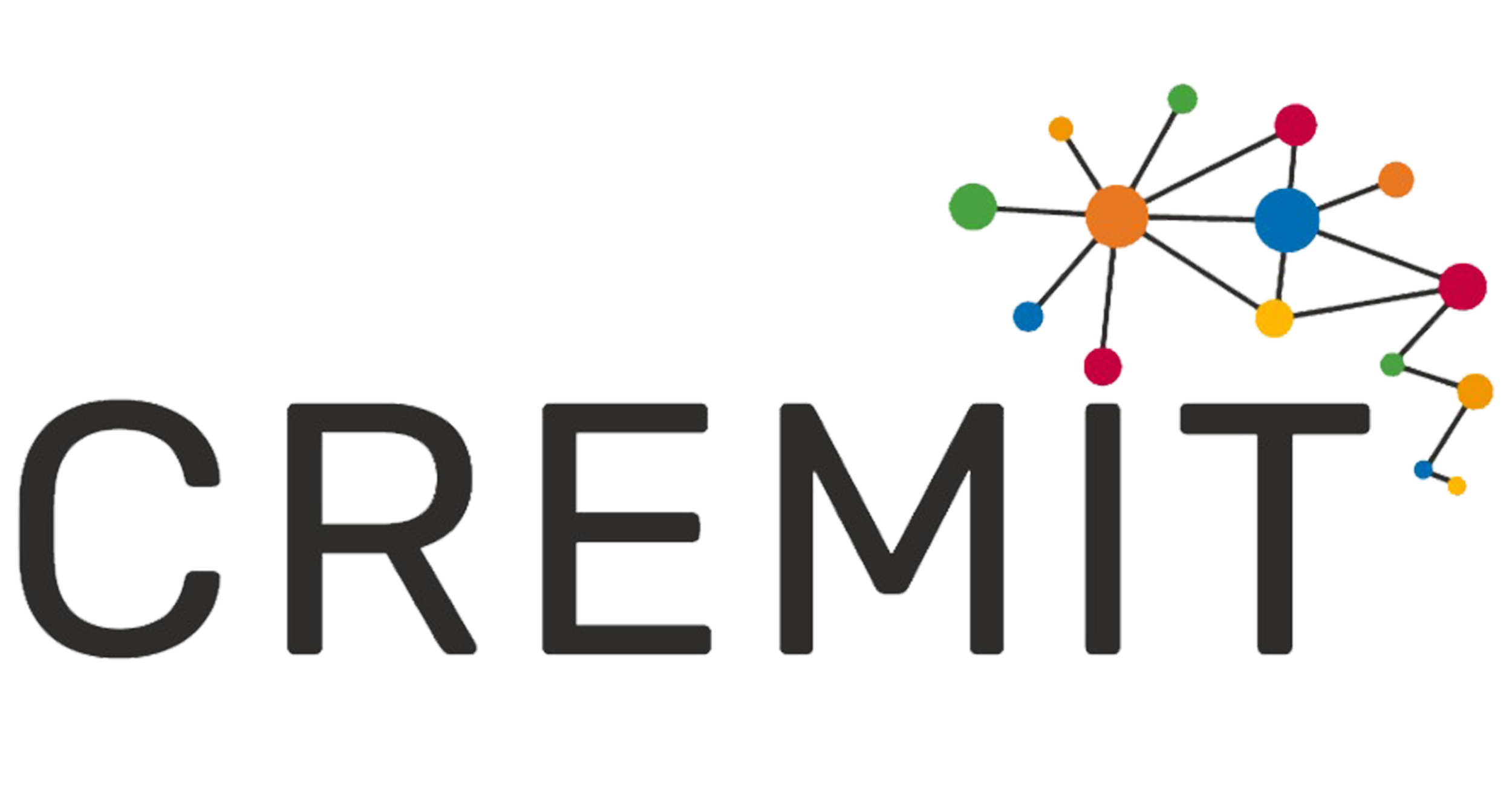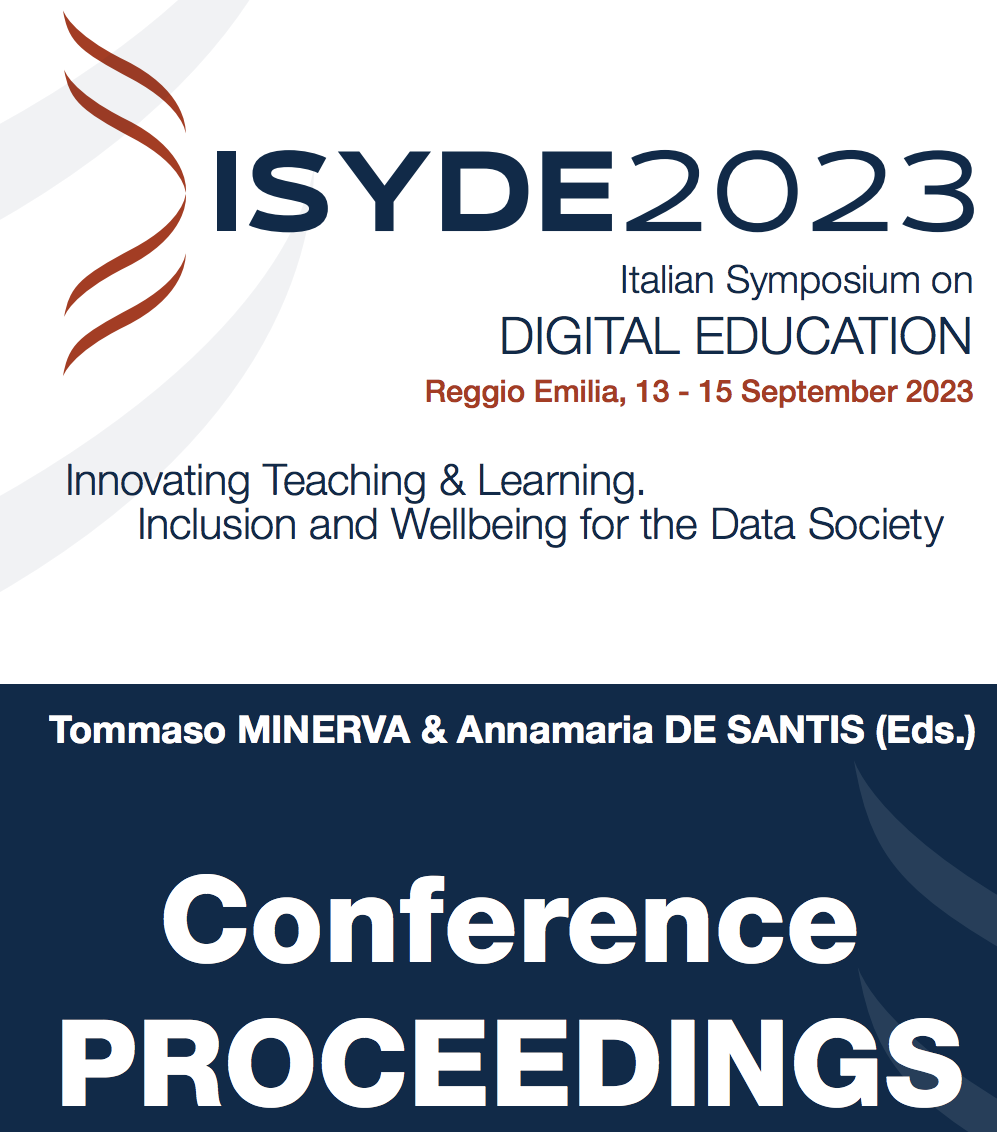ISYDE, Italian SYmposium on Digital Education, is the yearly conference organized by the Italian e-Learning Society (SIe-L, https://www.sie-l.it/), whose aim is to broaden the focus from e-Learning and media education to Digital Education.
In particular, as stated in the Preface of the brand-new publication:
ISYDE addresses and debates the major transformations induced by technologies in the processes of training, learning, continuing education, and knowledge construction as well as citizenship and
Tommaso Minerva, Annamaria De Santis
interpersonal relations. The 2023 edition focused on “Innovating Teaching & Learning. Inclusion and Wellbeing for the Data Society”.
As always alongside the pinning down of the main thread, the conference served as a meeting point and sounding board for the research, experiences, developments, and technological applications that are fostering development in the following significant, though not exhaustive, subject areas: AI in Education; Digital Citizenship; Blended Learning; Career Development and Training; Collaboration Projects and Networks; Computer Supported Collaboration; Digital Inclusion; Data Literacy & Education; Digital Literacy; Digital mediated diseases and behavioral risks; Digital Wellness; Distance Learning in Times of Crisis; e-Content Management and Development; Educational Software & Serious Games; e-Learning; Emerging Technologies in Education; Experiences in Education and Research; Faculty Development and Higher Education; Gaming and Gamification in Education; Learning Spaces; Pedagogical Innovations in Education; Post-Digital Education; Third Spaces Literacies; Trends and Issues in Education.
CREMIT attended ISYDE 2023 with three contributions:
Section 3
Games, social networks, and virtual/augmented reality:
GAMES AND VIDEO GAMES AS SCENARIOS TO SUPPORT DIGITAL
LITERACIES: THE FIRST RESULTS FROM THE INTERNATIONAL PROJECT
YO-MEDIA (YOUNGSTERS’ MEDIA LITERACY IN TIMES OF CRISIS)
Alessandra CARENZIO, Simona FERRARI, Stefano PASTA
Abstract
The younger generation is facing many changes and challenges related to political, military, and pandemic crises that have gained prominence in the media: in this perspective, Media Literacy and critical thinking are crucial to handling information and false content. Youngsters, in fact, often scroll through news content on their mobile devices without giving too much thought, consuming news content exclusively through social media (Herdzina & Lauricella, 2020; Jolley et al., 2021). The contribution will focus on the first results of the project YO-MEDIA – Youngsters’ Media Literacy in Times of Crises – funded by the European Media and Information Fund established by the European University Institute and the Calouste Gulbenkian Foundation. In particular, we will focus on the primary connections between the point of view of scholars and researchers – expressed in papers and scientific contributions from the literature analysis – and the perspective of teachers, educators, and journalists interviewed. Drawing on a selection of data from the 46 scientific papers produced by scholars, from 2019 to 2023 in games and video games in times of crisis, and the interview conducted with teachers, educators, and journalists with background on media studies, games, and crisis management (N.10 in Italy) the main questions are: in what way can game-playing foster youngsters’ media literacy in times of crisis? From what perspective are video games considered thinking about crises such as war, climate, and health
emergencies? Are there experiences that can be regarded as good practices?
Keywords: Media Literacy, Crisis, Video Games, Games, Emergency
Section 4
Scenarios, experiences, and research reports
INSIDE BLACK MIRROR: MEDIA, SOCIETY, EDUCATION.
A MULTIDISCIPLINARY WORK FOR THE STUDY OF MEDIA
AND AUDIOVISUAL EDUCATION AT SCHOOL
Alessandra CARENZIO, Elisa FARINACCI
Abstract
In recent years, especially in response to the pandemic, a variety of Media Education and audiovisual literacy courses have multiplied in response to the increasingly mediated experience of being in the world and onlife presence of technologies (Floridi, 2017). The contribution intends to discuss a theoretical perspective and a proposal to work with schools and extra-school contexts on and with the TV series Black Mirror to (1) gain insight into the workings of the contemporary media context; (2) expose students to the social implications of living in a mediatized world (the relationship with devices, the fine line between media control and trust, cyber stupidity, the cohabitation of public and private); (3) learn basic skills to detect and understand the use of the audiovisual language. Black Mirror is a science fiction series organized into self-contained episodes that cross different genres each time, touching in each episode a specific thematic scenario that forwards the relationship between man and technology in a possible future. This TV series perfectly meets the objectives of a “New Media Education”, allowing it to critically explore multiple characteristics of the contemporary media landscape and how its potential future impacts our lives. Therefore, the project comprises a collection of lesson plans to adopt in different school and educational contexts. The activities have been designed around images and texts from a selection of Black Mirror episodes and sequences, with ready-made scenarios and lesson plans to engage adolescents and younger people.
Keywords: TV Seriality, Media Education, Audiovisual Literacy, Education, Interdisciplinarity.
PRODUCING DIGITAL ARTIFACTS TO COUNTER “DIGITAL EDUCATION
POVERTY” IN THE LOGIC OF THIRD SPACE LEARNING
Stefano PASTA, Michele MARANGI
Abstract
Since 2021, the Research Centre on Media Education, Innovation and Technology (Cremit) has been proposing to use the new construct of “digital educational poverty”, overcoming and expanding the concept of “digital divide”. In terms of defining the paradigm, it should be emphasized that the concept of digital educational poverty is the result of the hybridization of two “digital competence’ reference frameworks”. One is based on a rights perspective, while the other focuses more on the dynamism and transdisciplinary nature of New Literacy, stressing how a segmented approach betrays the “citizenship vocation” of digital competence.
The study analyzes a sample of 214 digital artifacts produced by lower secondary school students from 100 schools, that are the outcomes of the newsrooms (Digital Writing: Wikipedia, Online Petition; Podcast: Review, Investigation; Digital Storytelling; Social Marketing), i.e. third learning spaces. They come from the project “Connessioni Digitali”, created by Save the Children together with Cremit and Edi Onlus to combat digital educational poverty. The artifacts will be analyzed both according to some indicators of the aesthetic, critical and ethical dimensions of digital competence and to the dimensions of the design and the implementation process leading to “Onlife Citizenship”. From the analysis of the artifacts of “Connessioni Digitali”, emerge both the complexity of the concept of digital competence, and the need to equip oneself with multiple methodologies and teaching tools to place the creation of concrete media products and the planning of communication strategies.
Keywords: Digital Competence; Digital Educational Poverty; Digital Divide; Onlife Citizenship; Third Spaces Literacies.
The proceedings – Minerva, T., De Santis, A. (2024) (eds). Proceedings of the Italian Symposium on Digital Education, ISYDE 2023. Pearson: Milano ISBN: 9788891936516 – can be accessed and downloaded for free:
https://it.pearson.com/docenti/universita/partnership/isyde.html








